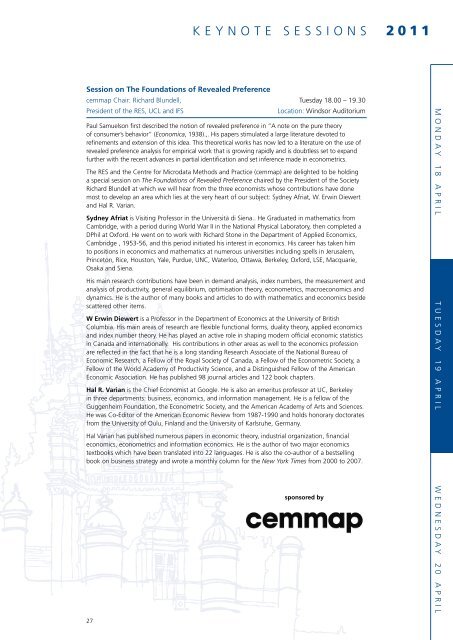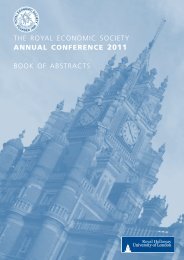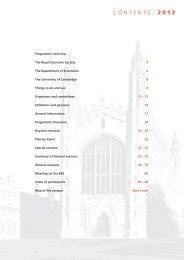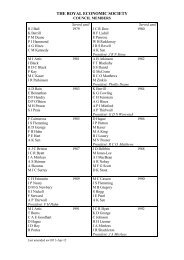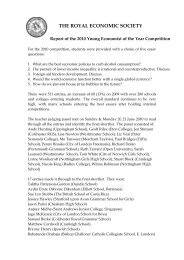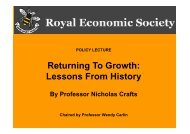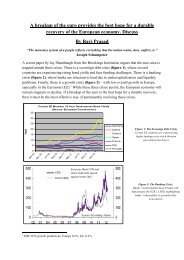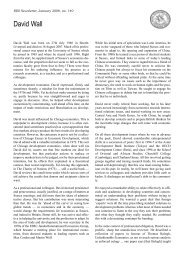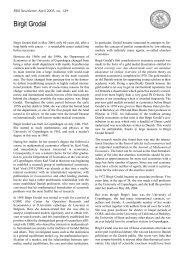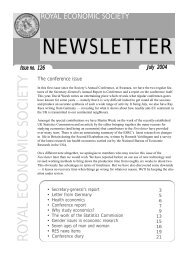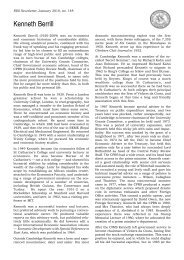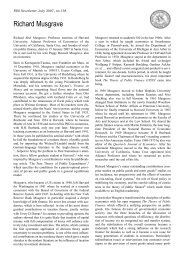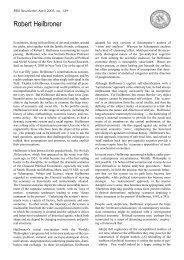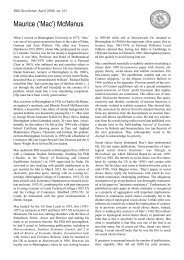High quality papers on theoretical, empirical and applied topics ...
High quality papers on theoretical, empirical and applied topics ...
High quality papers on theoretical, empirical and applied topics ...
You also want an ePaper? Increase the reach of your titles
YUMPU automatically turns print PDFs into web optimized ePapers that Google loves.
Sessi<strong>on</strong> <strong>on</strong> The Foundati<strong>on</strong>s of Revealed Preference<br />
k e y n o t e s e s s i o n s 2011<br />
cemmap Chair: Richard Blundell, Tuesday 18.00 – 19.30<br />
President of the RES, UCL <strong>and</strong> IFS Locati<strong>on</strong>: Windsor Auditorium<br />
Paul Samuels<strong>on</strong> first described the noti<strong>on</strong> of revealed preference in “A note <strong>on</strong> the pure theory<br />
of c<strong>on</strong>sumer’s behavior” (Ec<strong>on</strong>omica, 1938).,. His <str<strong>on</strong>g>papers</str<strong>on</strong>g> stimulated a large literature devoted to<br />
refinements <strong>and</strong> extensi<strong>on</strong> of this idea. This <strong>theoretical</strong> works has now led to a literature <strong>on</strong> the use of<br />
revealed preference analysis for <strong>empirical</strong> work that is growing rapidly <strong>and</strong> is doubtless set to exp<strong>and</strong><br />
further with the recent advances in partial identificati<strong>on</strong> <strong>and</strong> set inference made in ec<strong>on</strong>ometrics.<br />
The RES <strong>and</strong> the Centre for Microdata Methods <strong>and</strong> Practice (cemmap) are delighted to be holding<br />
a special sessi<strong>on</strong> <strong>on</strong> The Foundati<strong>on</strong>s of Revealed Preference chaired by the President of the Society<br />
Richard Blundell at which we will hear from the three ec<strong>on</strong>omists whose c<strong>on</strong>tributi<strong>on</strong>s have d<strong>on</strong>e<br />
most to develop an area which lies at the very heart of our subject: Sydney Afriat, W. Erwin Diewert<br />
<strong>and</strong> Hal R. Varian.<br />
Sydney Afriat is Visiting Professor in the Università di Siena.. He Graduated in mathematics from<br />
Cambridge, with a period during World War II in the Nati<strong>on</strong>al Physical Laboratory, then completed a<br />
DPhil at Oxford. He went <strong>on</strong> to work with Richard St<strong>on</strong>e in the Department of Applied Ec<strong>on</strong>omics,<br />
Cambridge , 1953-56, <strong>and</strong> this period initiated his interest in ec<strong>on</strong>omics. His career has taken him<br />
to positi<strong>on</strong>s in ec<strong>on</strong>omics <strong>and</strong> mathematics at numerous universities including spells in Jerusalem,<br />
Princet<strong>on</strong>, Rice, Houst<strong>on</strong>, Yale, Purdue, UNC, Waterloo, Ottawa, Berkeley, Oxford, LSE, Macquarie,<br />
Osaka <strong>and</strong> Siena.<br />
His main research c<strong>on</strong>tributi<strong>on</strong>s have been in dem<strong>and</strong> analysis, index numbers, the measurement <strong>and</strong><br />
analysis of productivity, general equilibrium, optimisati<strong>on</strong> theory, ec<strong>on</strong>ometrics, macroec<strong>on</strong>omics <strong>and</strong><br />
dynamics. He is the author of many books <strong>and</strong> articles to do with mathematics <strong>and</strong> ec<strong>on</strong>omics beside<br />
scattered other items.<br />
W Erwin Diewert is a Professor in the Department of Ec<strong>on</strong>omics at the University of British<br />
Columbia. His main areas of research are flexible functi<strong>on</strong>al forms, duality theory, <strong>applied</strong> ec<strong>on</strong>omics<br />
<strong>and</strong> index number theory. He has played an active role in shaping modern official ec<strong>on</strong>omic statistics<br />
in Canada <strong>and</strong> internati<strong>on</strong>ally. His c<strong>on</strong>tributi<strong>on</strong>s in other areas as well to the ec<strong>on</strong>omics professi<strong>on</strong><br />
are reflected in the fact that he is a l<strong>on</strong>g st<strong>and</strong>ing Research Associate of the Nati<strong>on</strong>al Bureau of<br />
Ec<strong>on</strong>omic Research, a Fellow of the Royal Society of Canada, a Fellow of the Ec<strong>on</strong>ometric Society, a<br />
Fellow of the World Academy of Productivity Science, <strong>and</strong> a Distinguished Fellow of the American<br />
Ec<strong>on</strong>omic Associati<strong>on</strong>. He has published 98 journal articles <strong>and</strong> 122 book chapters.<br />
Hal R. Varian is the Chief Ec<strong>on</strong>omist at Google. He is also an emeritus professor at UC, Berkeley<br />
in three departments: business, ec<strong>on</strong>omics, <strong>and</strong> informati<strong>on</strong> management. He is a fellow of the<br />
Guggenheim Foundati<strong>on</strong>, the Ec<strong>on</strong>ometric Society, <strong>and</strong> the American Academy of Arts <strong>and</strong> Sciences.<br />
He was Co-Editor of the American Ec<strong>on</strong>omic Review from 1987-1990 <strong>and</strong> holds h<strong>on</strong>orary doctorates<br />
from the University of Oulu, Finl<strong>and</strong> <strong>and</strong> the University of Karlsruhe, Germany.<br />
Hal Varian has published numerous <str<strong>on</strong>g>papers</str<strong>on</strong>g> in ec<strong>on</strong>omic theory, industrial organizati<strong>on</strong>, financial<br />
ec<strong>on</strong>omics, ec<strong>on</strong>ometrics <strong>and</strong> informati<strong>on</strong> ec<strong>on</strong>omics. He is the author of two major ec<strong>on</strong>omics<br />
textbooks which have been translated into 22 languages. He is also the co-author of a bestselling<br />
book <strong>on</strong> business strategy <strong>and</strong> wrote a m<strong>on</strong>thly column for the New York Times from 2000 to 2007.<br />
27<br />
sp<strong>on</strong>sored by<br />
m o n d a y 1 8 a p r i l t u e s d a y 1 9 a p r i l w e d n e s d a y 2 0 a p r i l


